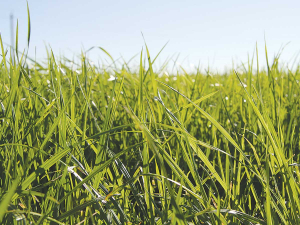Government Declares Medium-Scale Adverse Weather Event in Bay of Plenty, Gisborne/Tairāwhiti, and Canterbury
Recent weather events in the Bay of Plenty, Gisborne/Tairawhiti, and Canterbury have been declared a medium-scale adverse event.
 Barenbrug Agriseeds has made its premium Shogun grass seed available “at close to cost” for Southland farmers.
Barenbrug Agriseeds has made its premium Shogun grass seed available “at close to cost” for Southland farmers.
Barenbrug Agriseeds is inviting Southland farmers to get in quickly on a special rate for hybrid grass seed to help repair flood-damaged pastures.
The company has made its premium Shogun grass seed available “at close to cost” and pasture systems manager Blair Cotching says there has already been some uptake from farmers and customers.
But he advised them to move quickly.
“It’s the end of February now, heading into March. You’d expect it to start cooling down relatively quickly.”
More than 1100 farms have been identified by Federated Farmers in priority flood zones, with many having suffered damage to infrastructure as well as pastures.
Heavy deposits of gravel and silt have been left on paddocks, worsening the province’s existing feed supply problems caused by poor winter crop establishment and low summer growth rates.
Cotching says Barenbrug has made Shogun available to several Southland retailers “at a significantly reduced price” to help farmers get pastures up and growing again as soon as possible.
“In most cases, pastures under water for less than a week, or under 2-3cm of silt will grow through and recover.
“The real concern is where more than 5cm of silt has been deposited, because this often kills the pasture underneath. In these situations, farmers will probably need to re-sow.”
Cotching says Shogun is ideal for flood recovery, because it is very fast establishing, can generate high volumes of feed in a relatively short period of time, and lasts in Southland conditions.
“Especially down South it could last four or five years. It’s a perennial crossed with an Italian ryegrass so you’ve got your perenniality, and your Italians are normally three or four year grasses, so it’s in the middle.”
A lot of people were still assessing the damage but his recommendation was to have a look at all paddocks and rank them.
“Even at around 15% damage it is actually worthwhile regrassing, in terms of the cost of regrassing and the value gained. You’re basically losing 15% production annually if you’ve got 15% covered in silt so it does add up pretty quickly in terms of impact on farmers’ bottom line.”
Cotching says farmers may need to get silt layers soil-tested before sowing new grass.
Most flood deposits have little to no organic matter, are low in N and may be low in P and S.
Shogun seed can be direct-drilled if appropriate, or sown after cultivation if paddocks need to be worked and aerated.
“These events are highly stressful and disruptive, especially as we head into autumn with many winter feed crops already behind where they should be, and in some cases on-farm supplements waterlogged or lost in the floods.
“We’re keen to help wherever we can, and we also encourage farmers to make full use of the resources and information available from DairyNZ and Beef+Lamb New Zealand.”
The Meat Industry Association of New Zealand (MIA) today announced that Chief Executive Officer Sirma Karapeeva has resigned from the role.
The winners of the 2026 Hawke’s Bay/Wairarapa Dairy Industry Awards were announced at the annual awards dinner held at Copthorne Solway Park in Masterton on Thursday evening.
Environment Southland is welcoming this week’s decision by the Environmental Protection Authority (EPA) to approve the release of Blaptea elguetai, a leaf‑feeding beetle that will help control the highly invasive Chilean flame creeper.
This March, the potato industry is proudly celebrating International Women’s Day on 8 March alongside the International Year of the Woman Farmer, recognising the vital role women play across every part of the sector — from paddocks and packhouses to research, leadership, and innovation.
Fruit trader Seeka posted a record profit and returns to shareholders in 2025.
Recent weather events in the Bay of Plenty, Gisborne/Tairawhiti, and Canterbury have been declared a medium-scale adverse event.

OPINION: A mate of yours truly reckons rural Manawatu families are the latest to suffer under what he calls the…
OPINION: If old Winston Peters thinks building trade relations with new nations, such as India, isn't a necessary investment in…